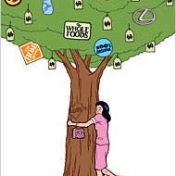Since the 2017 fall quarter, my friends and I have been working out regularly at the IMA, putting in about 1-2 hours every day. There, we often overhear conversations about fats, carbs, and proteins. We also talk about food a lot, and we never realized we acquired a different way of talking and thinking when it comes to food. What… Read more »
Buying products marked “green” or “eco-friendly” may promote our culture’s emphasis on environmental sustainability, ensuring demands placed on the environment do not surpass what it is capable of fulfilling for present and future generations, as a value. However, the result of purchasing based on environmental claims is often the opposite of an individual’s intent. Environmental claims for products are not… Read more »
In his book In Defense of Food, Pollan talks about how Americans have lost faith in what their mothers are telling them to eat and are placing greater trust in food scientists. The relationship of breaking food down to its carbs, sugars, and nutrients is not proving beneficial for consumers of the western diet. Who can we trust when deciding what to… Read more »
It’s amazing how many different places our food comes from. We don’t think about it because it’s so easy to take it for granted – we eat food every day. But the entire process is insane. Suppliers, producers, resellers, transporters, and more. (full size image here) Now look at the supply chain for Annie’s Mac n Cheese. (full size image… Read more »
In the 1940s processed foods began their rise to prominence in the American diet. Foods that used to be too expensive for the average consumer suddenly became readily available to them. Although Americans were better able to feed themselves, rates of malnutrition and other new illnesses began to rise. To combat this, producers started supplementing their nutrient stripped foods with… Read more »
My previous understanding of the holistic consequences of the Western diet was drastically challenged by Michael Pollan’s In Defense of Food. Specifically, Pollan argues that analyzing the Western diet in terms of the chemical compounds of separate nutrients does not fully represent the habits and norms of the food culture itself. Often, the harmful effects of the tendencies of Western… Read more »
Sociology professor Andrew Szasz came up with the term “inverted quarantine” to describe people who seek to isolate themselves from exterior ecological threats by way of individualizing environmental responsibility. Similarly, according to Michael Maniates, Americans think that the environment can be spared as a result of smart consumer action done by individuals. Such an idea is also the main focus… Read more »
Apathy: one of the biggest issues facing the fulfillment of our shared civic responsibility. People don’t think that their vote or their action can make a difference, and thus they don’t utilize their individual power to spark change. That being said, this week’s readings and lectures have caused me to— rightfully so— question the individualistic rhetoric surrounding apathy. The juxtaposition… Read more »
In his book In Defense of Food, Pollan discusses the shift from food culture to food science in the Western world. Food culture is complex, and can have many different definitions largely revolving around the different perceptions of food. Food science jump-started in the US, which ties into mostly historical, and somewhat current, political, wealth, and socio-economic aspects. The combination… Read more »
We live in a very fast pace world and free time is often hard to come by. Most Americans are working up to 40 hours a week if not more. The process of purchasing and cooking a healthy whole foods meal as Michael Pollan the author of In Defense of Food suggests takes both time and labor. It is much… Read more »

